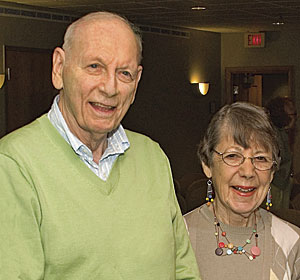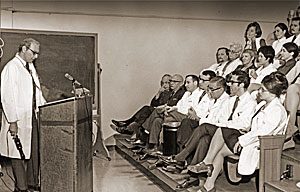“To be a well-flavored man is the gift of fortune, but to write or read comes by nature.” — William Shakespeare

Personally, he is a Northerner turned Southerner who lives happily in the Midwest. With Jane, his wife of 66 years, he shares an interest in sculpture and travel, as well as three children, three grandchildren and a brand-new great-granddaughter. A courtly man, Kahn has a charming fund of stories and a sly sense of humor. There is, for example, the matter of his trademark bow tie.
“My father wore bowties very often,” he explains, “and those were the ones I could borrow most easily. Of course, in pediatrics, it is an added safety measure. A four-in-hand will drop down over a baby, and he will grab it — or worse…”
A friend — fellow pediatrician and Kahn’s long-ago chief resident, John C. Herweg, MD — reflects on Kahn’s career, calling him a teacher, an expert on health care delivery and an all-around learned man. “Appropriate words to describe him are competence, dedication, integrity, reliability and friendliness,” says Herweg. “He is a modern Renaissance man.”

Lawrence Kahn, MD, in his role as an instructor
At age seven, Kahn and his family boarded a train in New York City, bound for their new home in Gadsden AL, where his father was setting up a textile factory. “The next morning, I raised the shade, and there was a Southern town, with broken-down shacks, signs that said “Smoke Lucky Strike,” and half a dozen small children in rags, watching the train go by. That was a culture shock.”
But the family adjusted, and Kahn went on to graduate from high school at 15 and attend the University of Alabama. He wanted to be a doctor like his older brother, Stanley, MD 43, but he first spent a postgraduate year in Alabama’s creative writing program while serving as teaching assistant to the well-known Shakespearian Hudson Strode. For medical school, he switched to Louisiana State University in New Orleans, where he met his wife, a social work student.
They moved to St. Louis, and Kahn did an internship at City Hospital, a charity institution and a busy place. “It was an ancient building with old gas jets on the wall, and the equipment was old, too,” he says. “But I rotated through most of the services, getting the experience of delivering a baby, amputating a leg. Every imaginable thing happened there.”
Next the U.S. Army snagged him for two years, assigning him to a Veterans Administration hospital in Tuscaloosa AL, that dealt largely with neuropsy-chiatric problems. By then he knew he wanted to be a pediatrician when his stint was up. “I liked working with children,” he says. “I liked the idea that they have a long future. I used to say children are truly the most honest people in our society.”
Alexis F. Hartmann, MD, chairman of Washington University School of Medicine’s Department of Pediatrics, accepted Kahn into the postgraduate program and he stayed three years in all, as a resident and Fern Waldman Research Fellow, working in the budding field of pediatric cardiology. His mentor was renowned pediatrician David Goldring, MD, who had taught himself the specialty.
Actually, Kahn recalls, the department was then made up of giants: Drs. Gilbert B. Forbes, Jean Valjean Cooke, Gene Klingberg, Merle Carson, Donald and Jean Thurston — some of whom went on to head programs elsewhere. Kahn loved academia, but the pay was only $9,000 per year. With a growing family, he had to look to private practice.
First, he joined the noted Central West End group headed by Park White and George Sato, then moved to Clayton to start his own practice. Years went by and the house calls, the unending well-child checks, and the sudden intensity of childhood illnesses, with their round-the-clock anxieties, all took their toll. He felt restless, and looked for a new challenge.
In the mid-1960s, government officials began to worry about the spiraling cost of health care, and they called a meeting of leading insurers, urging them to find solutions. Metropolitan Life was one of them — and through William H. Danforth, MD, then vice chancellor for medical affairs, the Met solicited the ideas of university faculty member Gerald Perkoff, MD. The experiment he designed was a prepaid group practice called Medical Care Group (MCG), and Philip R. Dodge, MD, recruited Kahn, who now joined the full-time faculty, to help test it.
A pilot program, using university physicians and patients from local firms, began in 1968 and was modestly successful, with huge savings on hospital costs but increased numbers of office visits. Both the medical school and Metropolitan were encouraged enough to keep the program going. After Perkoff left the university in 1979, Kahn became medical director, and by the 1980s, MCG had increased sufficiently in size so that it was close to operating without a deficit.
But questions arose over the relative value of MCG and another newly developed health care entity, the Independent Practice Association (IPA). In 1985, amid a dispute about MCG’s structure and future, Kahn left the program. Soon the IPA died, as did MCG, though the pediatric portion still thrives today. Kahn, who had also inaugurated a successful nurse practitioner program, continued for a time to lecture in health care administration. He retained a strong interest in health care reform, writing newspaper columns in the 1990s favoring — as he still does — a more equitable, cost-effective system with salaried physicians, coverage for all and a markedly less influential insurance industry.
But Kahn also returned to his literary roots, especially after a new Washington University program — the Lifelong Learning Institute (LLI) — began offering peer-learning classes to seniors in 1995. “LLI is a delightful way for people who don’t just want to smell the roses to keep active intellectually,” he says.
Over the years, he and his wife have covered many writers — Virgil, Dante, Proust, Faulkner and the Bloomsbury Group, among others — enrolling overflow classes for a complete cycle of Shakespeare’s plays. His favorite? King Lear. “Lear peered into the abyss and discovered who he was,” says Kahn.
As Kahn looks at his own life to date, he is grateful to the university for his education and many varied opportunities. “Washington University is one of the most remarkable institutions in the country,” he says. “It allowed me to have an unusual and very interesting medical career and made a wonderful retirement available to me.”
What to do more than just smell the roses?
The Lifelong Learning Institute at Washington University offers a wide variety of courses that emphasize peer learning and active class participation by senior adults. Study groups are noncredit; there are no exams, no grades. Nevertheless, this learning community takes its responsibilities seriously, and student participation is vital. To learn more about the Lifelong Learning Institute, please visit: lli.ucollege.wustl.edu.
This article appeared in the Fall 2009 issue of Washington University School of Medicine’s Outlook magazine.